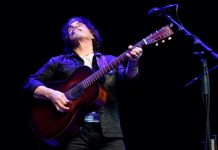
Last September, Lucinda Williams graced the Variety Playhouse’s stage on back-to-back nights, the southernmost stop of her month-long tour. The 63-year-old singer-songwriter is one of the South’s most influential musicians, so Atlanta was a natural place to announce the release of The Ghosts of Highway 20 (available February 5). The record is based on her memories of the region surrounding the 1,535-mile interstate that snakes from South Carolina through Georgia (where Williams spent part of her childhood) and all the way to west Texas.
“The last time I was in Macon, as we were leaving, I was looking out the window seeing the exit signs for all these towns that I remembered from the early part of my life,” says Williams. “[Highway 20] was the highway that connected them all back then, when they used to have highways instead of freeways.”
Williams says the album is a follow-up of sorts to 1998’s Car Wheels on a Gravel Road and a fresh look at a region in flux. “You want places to grow,” she says. “But everything changes so much. That’s what’s happened to most of the South.”
From her home in Los Angeles, Williams chatted with us about how Georgia played a role in the creation of her new record, how the South has changed over the decades, her support for Bernie Sanders, and her newfound fascination with dub remixes.
At this point of your career, why was it the right time to create a record based on one of the South’s longest highways?
It ties into some of the loss I’ve experienced, the two greatest losses, over the last 10 years. My mother passed away in 2004, around the time West came out. And my dad died on January 1, [2015], which is the same day Hank Williams died. Needless to say, I’m still in that place of grieving with my dad. That’s pretty fresh.
I’ve been back to Macon, Georgia, twice now to do a show at the old Cox Theatre in downtown Macon. I was amazed at how little it changed from the last time I was there. Macon is where I started school. That was the part of my childhood where we lived in Jackson, where my sister was born; Vicksburg, where my brother was born; Macon, where I started school; and Monroe. Most of these towns are off of Highway 20. My mother grew up in Monroe and is now buried there. There were all these connections. As we were leaving [Macon] that night, Tom [Overby, her husband and personal manager] and I were sitting there, and I was looking out the window seeing the exit signs for all these towns that I remembered from the early part of my life. That was the highway that connected them all back then, when they used to have highways instead of freeways.
The two pivotal things that happened in Macon were between the ages of four and five years old. My dad [poet Miller Williams] took me with him to visit Flannery O’Connor in Milledgeville, Georgia. I don’t remember a whole lot of it. She raised peacocks. He went to speak with her. I chased the peacocks around. Then later, as a teenager, I devoured all her work. It really informed my writing. When I was about six, my dad took me to downtown Macon to see this blues preacher and street singer by the name of Blind Pearly Brown. He had been inspired a great deal by Blind Willie Johnson, playing slide guitar and doing all of those blues gospel songs. That had a huge impact on me. The seed was planted.
What about that moment captivated you in particular?
He was playing on the streets. I just remember standing there with my dad, holding his hand, staring in wide-eyed amazement. And I listened to his music after that because he managed to make an album [in 1961]. It was one of the first albums I listened to over and over again, trying to figure out the words to the songs. His dialect was so thick, you know, that it was hard to understand him. He was a preacher, he was blind, and he was a street singer. There were a lot of those back then, guys who have been rediscovered. Before him, there was Blind Willie Johnson, Blind Willie McTell. But he was the first blues singer and guitar player I had ever seen live. I liked it; even as a six-year-old kid, it connected with me. Seeing him there in person, being that close to that with people gathering around, it was a pretty heavy moment. It was something you don’t run across anymore these days. I later devoured music by every blues artist that ever existed, studied the Delta blues, but his was more in the country blues style. Blind Willie Johnson informed his music; almost everything he did was learned from him.
What’s your connection to Atlanta? It’s mentioned in the one sheet for this record, but there’s not much about it in other articles about your work.
I lived there before Macon. I was young. I don’t remember anything from there. In Macon, we were there at least for a couple of years. I went to first grade and second grade there and I think kindergarten there.
The songs on The Ghosts of Highway 20 aren’t about particular places from your past. But you’ve described it as a larger experience of a region that’s constantly changing. How has that influenced your life and music?
The South in that time period, a lot of those things are gone now. Some of the things you might have seen there. Look at the old photographs from that time. It’s kind of like if you were writing about Highway 61, the old highway, and all the things that ran off of that highway aren’t there anymore. It’s America during that time and the things you might have seen. I talk about some of that in the song “The Ghosts of Highway 20.” That was one of the last songs I wrote, actually. I wasn’t necessarily going to call the album that. I wasn’t sure what I was going to call it. I had the majority of the songs written and recorded from when we did my last album, Down Where the Spirit Meets the Bone. When we had all the songs, certain ones seemed to fit together better, and those are the ones that ended up on The Ghosts of Highway 20.
But the idea of the song “The Ghosts of Highway 20,” Tom suggested that line and approached me about doing a song around that idea. At first, I wasn’t sure what I would say that I hadn’t already said before on “Car Wheels on a Gravel Road,” “Jackson,” “Bus to Baton Rouge,” and all these others songs about that kind of thing. He gave some ideas he jotted down and said if something was there to come up with. He thought it would be a great song to tie everything together. I sat down with it for a few days; brought together my notes from some songs, along with what he had written; and something opened up, and I came up with this idea. Then I was glad.
We’ve been looking at the art lately. There is a tie between the Car Wheels on a Gravel Road album and this one. It’s then and now. There are shots of me in an old car that we just took on the last photo shoot. You’ve got the old car and the car wheels. With Car Wheels on a Gravel Road, that whole album is very subtle. This is me now 20 years later. The title track is about going back and remembering a place you lived in a long, long time ago—remembering people you’ve lost, not just my family members, but the Delta blues singers from that area died all along there. The ghosts just means the memories of who and what was there. There’s another line, faded billboards and firework stands, remembering the things you’d see along the highway.
So it’s bookending the experience captured in Car Wheels on a Gravel Road?
Exactly. It wasn’t a conscious effort. But these were the songs I was writing at a particular time. The [new] songs “Death Came,” along with “Doors of Heaven,” those were written after my mother died. There’s another kind of similar one, “If There’s a Heaven,” I wrote that after my father died. It’s all connected and makes a lot of sense to me.
You live in Los Angeles now. Are there certain places in the South that particularly stand out as the ones that have changed whenever you’ve returned?
It’s very rare now. There’s what I call the New South. It was when we played in Macon. The theater is right downtown in Macon. With the exception of a couple of Chinese restaurants or sushi places that have popped up from immigrants for some reason deciding to settle there, nothing has changed. It’s totally different than Nashville or Atlanta that are just these boomtowns. For whatever reason, Macon just got passed by. I remember, right across the street from the theater, there was one of these black unisex barbershops that looked like it had been there since the 1970s at least. I just remember being wowed. It almost gave me chills. I almost felt like I had gone back in time. They renovated the theater, but it stills looks [similar], and that in and of itself is a historical place where the Allman Brothers got started.
In a way, you want places to grow; you want the economy to be better there. But everything changes so much. And that’s what’s happened to most of the South. It could also be said of the whole country as a general rule. We’ve lost so much of certain cultural things that were in place back there. You know, my song “Get Right with God” was inspired by a postcard of a 1976 photograph of this handmade sign along [Highway 82 in Mississippi] that we used to see. It said in big letters, “Get right with God.” I got to meet the photographer, the guy who photographed that sign in the shape of a cross that was stuck into the ground, when we were playing in Chapel Hill, North Carolina. His name is Bill Ferris, and he’s a folk music historian who teaches at the college there and is also a photographer. He sent us all these photographs. In fact, we’re in the process of trying to incorporate a couple of them into the album package because they’re so reminiscent of that era.
One of my favorite songs of the record is one called “Place in My Heart.” What inspired that song?
It sounds like an older song. A lot of them sound like old songs. I was thinking about my brother a lot when I was writing that. It could be a love song. But it could just be about someone you care about. I’ve written a few songs about him, like “Are You Alright?”, that are about me being here when you decide to come back if you need me. For some reason, he’s just decided . . . it’s just really painful. I love him and care about him. But he’s kind of just disconnected himself. There’s not much you can do. I call him; I can’t get him on the phone. So, you know, from time to time I write these songs about that, all the way back to “Little Angel, Little Brother” and “I Don’t Know How You’re Livin’.” These ideas grow into songs. They grow bigger then, and people interpret them in their own ways.
In continuously writing about your brother, do you still find solace, or does it ever feel like a futile exercise?
I still find comfort in it. Unfortunately, some things need to change, but they don’t change. It keeps me from going crazy.
Shifting gears altogether, when you were recently in Atlanta, your encore included a resounding endorsement of Bernie Sanders. Why do you support him?
When I first started playing guitar and getting into folk music, that was the thing. The early songs of Bob Dylan were all about social injustice. I got into all of that as a teenager and went to demonstrations. I was just a real rebel. That’s still in my blood. It’s always been in my blood. My dad became close friends with George Haley, one of the first black students at the University of Arkansas during the 1950s. My dad was a student there at the time. He became friends with George Haley, who went through all kinds of name-calling and racial slurs. Then later, when I was born, George Haley became my godfather. My grandfather on my dad’s side was involved in farmers union struggles with sharecroppers trying to unionize back in the 1930s. My grandfather was a conscientious objector in World War I, which was unheard of.
So I’m drawn to Bernie Sanders because he reminds me of my grandfather in a way. He’s a democratic socialist. He’s basically a Democrat with socialist leanings, which completely scares people away, and that’s ridiculous because all it means is equality for all. Everybody deserves a roof over their head and food to eat. He’s all about the old adages that go way back to Woody Guthrie and Joe Hill like, “It’s a rich man’s war and a poor man’s fight” and “The rich get richer and the poor get poorer.” That’s what Woody Guthrie was singing about. That’s what Bob Dylan was singing about. That’s what all the folk singers in the 1960s were singing about. I’m coming from that era, and I get excited when I see someone like Bernie Sanders, who I can see is honest and truthful and is actually a leftist. I’ll be blown away if he gets elected. But who knows.
Going back to the record, the last song, “Faith and Grace,” is a track that’s more than 12-minutes long and unlike most of your songs. How did that come together?
The guys who play on “Faith and Grace” were two Jamaican guys. One of them, Carlton “Santa” Davis, used to play with Peter Tosh and was one of several people in the room when he was assassinated (Santa was shot in the shoulder). This guy Ras Michael, who lives in Los Angeles and is from Jamaica, every time we’d run into him, he’d tell Tom, “I need to get you and Lucinda to come to Jamaica to play with these guys”—kind of like Keith Richards with that Wingless Angels album. But it never came about.
When we were in the studio, he approached Tom and said he wanted to bring these two guys in to do something with me in the studio.
We didn’t know what song we were going to do or anything. Tom had a couple of suggestions. I didn’t want to do a reggae song. I love Bob Marley, but that ain’t gonna happen. We ended up doing a version of this song from an early Mississippi Fred McDowell album of all these gospel songs. These two guys came in. Michael is the head of the Rastafarian church in L.A., and he’s older and played a conga drum. Davis is younger, in his 50s or 60s, and he’s a drummer who plays Jamaican music as well as jazz music. There was also my bass player, David Sutton, and Bill Frisell on guitar. That configuration had never played together before. So I just started with the vocal leads and showed them the song. We just went off, and it turned into this A Love Supreme moment. It was a spiritual experience. When we got done, it was like an 18-minute version. That was pretty cool.
Where did you record this particular session?
We did it all at a place call Dave’s Room with [recording engineer] Dave Bianco (Bob Dylan, Tom Petty, Susan Tedeschi). It’s his own little studio in this funky part of North Hollywood on Lankershim Boulevard. It’s real comfortable. We cut everything there. It’s pretty close to where Tom and I live. He bought the studio. It was actually an old studio from the 1960s and 1970s. The guy who ended up with it didn’t know what he had. David Bianco found out it was for sale, checked it out, and wanted to rescue it. He bought it and got it to how it is now. We’ve grown fond of him. It’s just him and his assistant engineer. It’s not like this big huge studio with a million people running around. It’s cool.
One other thing, David Bianco ended up doing a dub remix on that song “Faith and Grace.” It’ll blow your mind.
Has it been released yet?
I’m going to make sure it comes out. It’s great. In fact, I told Tom that I wanted Dave to do several of those. I could see it done with “Joy,” “Get Right with God,” and other songs. I didn’t realize this, but Dave Bianco and his assistant are both musicians, and they actually overdubbed the instruments onto it. It’s really cool. I love that kind of stuff.
This article originally appeared in our February 2016 issue under the headline “The Road Home”











![The North Carolina Museum of Natural Sciences’ newest exhibit is a [pre]historic first](https://cdn2.atlantamagazine.com/wp-content/uploads/sites/4/2024/04/DD-3-100x70.jpg)


